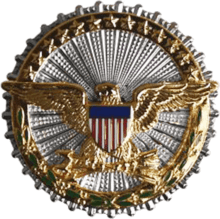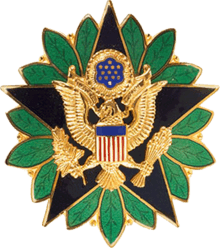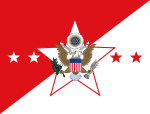John A. Wickham, Jr.
| John A. Wickham | |
|---|---|
|
Wickham in August 1988 | |
| Born |
June 25, 1928 Dobbs Ferry, New York, U.S. |
| Allegiance |
|
| Service/branch |
|
| Years of service | 1950-1987 |
| Rank |
|
| Commands held |
1st Brigade, 3rd Infantry Division 101st Airborne Division United Nations Command United States Forces Korea Eighth Army Army Chief of Staff |
| Battles/wars |
Korean War Vietnam War |
| Awards |
Silver Star (2) Bronze Star Purple Heart Air Medal (10) Legion of Merit (4) Distinguished Service Medals (8) (Defense, Army, Navy and Air Force) Combat Infantryman Badge Expert Infantryman Badge Parachutist Badge Air Assault Badge Doughboy Award |
John Adams Wickham, Jr. (born June 25, 1928) is a retired United States Army general who served as the U.S. Army Chief of Staff from 1983 to 1987.
Early life and education
Wickham was born on June 25, 1928, in Dobbs Ferry, New York. He graduated from the United States Military Academy in 1950, where he later served as a social sciences instructor, from 1956 to 1960.
Career
Upon graduation from the U.S. Military Academy in 1950, Wickham was commissioned a second lieutenant and assigned to the 18th Infantry Regiment and then the 6th Infantry Regiment in Berlin. He served as a platoon leader and company executive officer in the 511th Airborne Infantry Regiment and served as an aide-de-camp to the commander in the 37th Infantry Division and 10th Infantry Division. He received master's degrees in economics and government from Harvard University and was a graduate of the National War College and Armed Forces Staff College.
Wickham then served as operations officer of the 1st Battle Group, 5th Cavalry, in Korea, and was executive officer to Army Chief of Staff Harold Johnson. Later he commanded in combat the 5th Battalion, 7th Cavalry Regiment, 1st Cavalry Division in Vietnam, where he was seriously wounded by a satchel charge explosive. Wickham spent over a year in the hospital recovering. He later commanded the 1st Brigade, 3rd Infantry Division in Germany.
Wickham returned to Vietnam as the Deputy Chief of Staff, MACV, and was responsible for negotiating release of all prisoners of war. He then commanded the 101st Airborne Division, was director of the Joint Staff of the Joint Chiefs of Staff, and afterward, as a four-star general, became Commander in Chief of the United Nations Command and Commander of the United States Forces Korea and Eighth Army in Korea.
In 1979, he played a leading role in calming political tensions after the assassination of South Korean President Park Chung Hee, and wrote a book "Korea on the Brink" about the dangerous period. He also served as senior military assistant to Secretaries of Defense James R. Schlesinger and Donald Rumsfeld. In 1983, President Ronald Reagan appointed him Chief of Staff of the United States Army.
Later work
He retired from the U.S. Army in 1987 after 37 years of active service. He was twice awarded the Silver Star for battlefield valor, as well as the Bronze Star for valor, the Purple Heart, 10 Air Medals, 4 Legions of Merit, 8 Distinguished Service Medals (Defense (4), Army (2), Navy and Air Force), Combat Infantryman Badge, Expert Infantryman Badge, Parachutist Badge, and 21 foreign decorations including the Republic of Korea's highest military decoration. He was named by Army Times as one of the ten leaders who most changed the Army. The Association of Graduates USMA presented him with the Distinguished Graduate Award in 2005, and he received the Infantry Doughboy Award in 2006.
Wickham served as Town Council President in Sun City, Arizona and as an elder at Saint Andrews Presbyterian Church in Tucson, Arizona . He served as Chairman of the Board for Honeywell Federal Systems and Nortel Federal Systems, and as director of several other corporations. He was named vice chairman for the United States-China National Committee and has served as a member of the Secretary of Defense Policy Board. He is also active in the United Way, and a member of the Alfalfa Club, and Council on Foreign Relations. In his autobiography My American Journey, General Colin Powell mentioned serving with Wickham and praised him as "every inch a Soldier".
Awards and decorations
|
Defense Distinguished Service Medal with three bronze oak leaf clusters |
|
Army Distinguished Service Medal with oak leaf cluster |
| Navy Distinguished Service Medal | |
| Air Force Distinguished Service Medal | |
|
Silver Star with oak leaf cluster |
|
Legion of Merit with three oak leaf clusters |
|
Bronze Star with "V" Device |
| Meritorious Service Medal | |
| Air Medal (10 awards) | |
| Army Commendation Medal | |
| Purple Heart | |
| Valorous Unit Award | |
| World War II Victory Medal | |
| Army of Occupation Medal | |
|
National Defense Service Medal with oak leaf cluster |
|
Vietnam Service Medal with eight Service stars |
| Army Service Ribbon | |
| Army Overseas Service Ribbon with bronze award numeral 2 | |
| Republic of Korea Taeguk Medal | |
| National Order of Vietnam Knight's degree | |
| Vietnam Gallantry Cross Unit Citation (two awards) | |
| Vietnam Campaign Medal |
Personal life
Wickham married Ann Lindsley Prior in 1955. They have three children and six grandchildren.
Quotes
- However, let's heed history's lessons, be more mindful about limits of our power and, above all, be prudent with strategy lest misguided military policies drain our national strength and undermine our international leadership.[1]
- "I've been a great believer in mentoring; helping younger people grow, and counseling them. I don't think we do enough of that in our society today."
Bibliography
- John Kie-chiang Oh, Korean Politics: The Quest for Democratization and Economic Development (Ithaca: Cornell University Press, 1999).
See also
References
External links
| Wikimedia Commons has media related to John A. Wickham, Jr.. |
- US should seek help in training Afghan forces
- Portrait of John A. Wickham, Jr. by Margaret Holland Sargent
| Military offices | ||
|---|---|---|
| Preceded by Gen. John William Vessey, Jr. |
Vice Chief of Staff of the United States Army 1982 – 1983 |
Succeeded by Gen. Maxwell R. Thurman |
| Preceded by Edward C. Meyer |
Chief of Staff of the United States Army 1983–1987 |
Succeeded by Carl E. Vuono |
|







